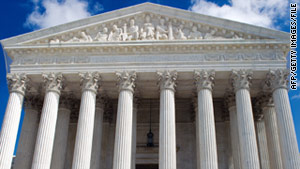Washington The U.S. Supreme Court has refused to jump into the controversial national debate over health care reform at this stage, 

rejecting a plea from Virginia for a judicial end-around -- an expedited review over whether the sweeping federal law is constitutional.
As expected, the justices without comment on Monday declined the state's "petition for certiorari before judgment."
Various state and private challenges to the Patient Protection and Affordable Care Act are now before federal appeals courts across the United States -- meaning it could take several months, at least, before they would go to the U.S. Supreme Court. Unusual requests such as Virginia's, to have its appeal move to the head of the line, rarely succeed since the justices traditionally like to have these kind of petitions fully analyzed and decided by lower courts before tackling them.
Federal judges have split on whether a key provision -- the "individual mandate" requiring most Americans to purchase health insurance by 2014 or face financial penalties -- is constitutional.
The high court could be asked this fall to take formal jurisdiction of one or more health care appeals, and decide the matter perhaps by 2012, a presidential election year.
In the meantime, a federal appeals court in Richmond, Virginia, early next month will hear two separate challenges to the reform legislation, including Virginia's petition. And an appeals court in Atlanta in June will hear arguments in a lawsuit filed by Florida and 25 other states over the law.
One pressing issue is whether parts of the law already in effect can continue to be enforced. The parts of the health care reform law currently being administered include small business tax credits, federal grants and consumer protection measures. The federal government wants to know whether these provisions can continue while the issue is under appeal, particularly in the 26 states that filed suit.
Oklahoma and a range of private groups have also filed separate legal challenges that are concurrently working their way through federal courts around the country.
The Affordable Care Act has about 450 individual components, placing a number of new or revised regulations on states, private insurance companies, employers and individuals.
Health care reform -- a top Democratic priority since the Truman administration -- passed in 2010. Opponents derisively labeled the measure "Obamacare." Republican leaders -- who captured the House of Representatives in the midterm elections -- have vowed to overturn or severely trim the law.
Two federal judges have ruled the health care act to be constitutional, while two others have concluded the opposite. That sets up what is likely to be a Supreme Court showdown, perhaps sooner rather than later.
Justice Elena Kagan apparently participated in the decision to deny fast-track status to the current appeals. The brief order from the court does not mention any refusal by the newest member of the court.
There been some calls for Kagan to step aside from deciding the issue, if it ultimately reaches the high court, because of her previous job as solicitor general, tasked with defending the Obama administration in high court challenges. The 50-year-old justice had refused at her July confirmation hearings to say whether she would participate in the health care reform dispute. The Justice Department has not indicated exactly what her role was in early discussions over defending the health care bill in court. She was nominated to the bench in May and confirmed in August.
Virginia officials had argued that the Constitution's Commerce Clause does not give the government the authority to force Americans to purchase a commercial product -- like health insurance -- that they may not want or need. They equated such a requirement to a burdensome regulation of "inactivity." Virginia is one of the few states in the country with a specific law saying residents cannot be forced to buy insurance.
"Expediting our case would have been the exception and so, although disappointing, this is not surprising," said Virginia Attorney General Ken Cuccinelli after the justices issued their order. "This case's logical end point is the Supreme Court. It will simply have to make its way through the Fourth Circuit (appeals court) first."
But backers of the law tried to downplay any high court review. "Proponents of this lawsuit have tried to frame it as a hugely important constitutional challenge steamrolling to the Supreme Court. It is, in fact, a nothing burger," said Doug Kendall, president of the liberal Constitutional Accountability Center. "By all rights, the legal challenge to health care reform should be rejected unanimously by the courts of appeals and never even be reviewed on the merits by the Supreme Court."
Among other things, the measure was designed to help millions of uninsured and underinsured Americans receive adequate and affordable health care through a series of government-imposed mandates and subsidies. The federal government stated in court briefs that 45 million Americans last year were without health insurance -- roughly 15% of the country's population.
Critics have equated the measure to socialized medicine, fearing that a bloated government bureaucracy will result in higher taxes and diminished health care services. About two dozen challenges have been filed in federal courts nationwide.
No comments:
Post a Comment